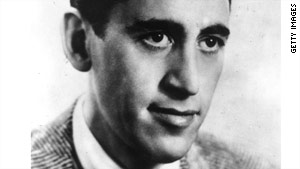By Paul Schmidt
“Among other things, you’ll find that you’re not the first person who was ever confused and frightened and even sickened by human behavior. You’re by no means alone on that score, you’ll be excited and stimulated to know. Many, many men have been just as troubled morally and spiritually as you are right now. Happily, some of them kept records of their troubles. You’ll learn from them—if you want to. Just as some day, if you have something to offer, someone will learn something from you. It’s a beautiful reciprocal arrangement. And it isn’t education. It’s history. It’s poetry.”
-J.D. Salinger, Catcher In the Rye
As I was preparing a post on the Illinois men’s basketball team, the news came across from the Tribune Breaking News Alerts that J.D. Salinger had passed away.
He was 91 years old.
It seems a little trivial now to write about whether or not a team that elected team captains mid-season has finally turned a corner.
Salinger had broken a hip last May, but according to his family’s statement, he was in better health since then and in no pain.
“It will either happen today or February 14, 1958 when I am sixteen. It is ridiculous to mention even.”
From “Teddy”, a short story, part of the collection Nine Stories
It’s difficult to write an obituary on a man who didn’t want to be in the public eye, and strove simply to be left alone as much as possible. And it wasn’t weird, or being hermit-like. He just felt that he wrote a book. And yeah, it meant a lot to people, but that didn’t mean he needed to be in the public eye, or have the public involved in his life.
So he went forth, with a real private life. A commendable job of living on his own terms as opposed to anyone else’s.
And since he is so difficult to commemorate after his death (and since I’m not a good enough writer to actually do it properly), I suppose that it would be fitting to say what Salinger and his characters meant to me.
Salinger’s writing had a much different affect on my life than it did on most: Reading books like Catcher In the Rye and Franny and Zooey made me want to be able to tell stories like he did, to affect people like he did, to make people feel the emotions that he did.
In short, I wouldn’t be here in front of you with this forum without Mr. Salinger’s stories.
Perhaps we all lose sight of why we are doing what we do at some point. I know that, at some point, I’d forgotten why I really wanted to start writing. I love expressing my thoughts and feelings about sports, and about the teams that I love, and being able to do that for all the people that read here is a privilege and an honor.
However, truly, the reason I got started doing this at all was because I was sick of a bunch of phonies in the world. I was tired of the mouthpieces we would see in all facets of the news, and I was tired of the phonies they were writing about.
I wanted to be able to tell the real stories of sports. Maybe we can all get back to that just a little.
“You take a really sleepy man, Esmé, and he always … stands a chance of again becoming a man with all his fac – with all his f-a-c-u-l-t-i-e-s intact.”
-“From Esme, With Love and Squalor”, a short story contained in Nine Stories
What Salinger referred to in the above quote was about how someone can be brought back to life by a simple act of kindness or innocence. In the story, the main character, Esme, helped Sergeant X basically come back to reality after being at war.
In my case, Salinger’s life and writings gave me the clarity to do what I wanted with my life. His death, sadly, has brought that back to focus…
And gave me my fac-…my f-a-c-u-l-t-i-e-s back. Thank you for that. Even though I’m sure that you wouldn’t find this an appropriate reaction to your death, I hope you don’t take it too personally. I can assure you I’m not one of the phonies.
“Boy, when you’re dead, they really fix you up. I hope to hell when I do die somebody has sense enough to just dump me in the river or something. Anything except sticking me in a goddam cemetery. People coming and putting a bunch of flowers on your stomach on Sunday, and all that crap. Who wants flowers when you’re dead? Nobody.”
– J.D. Salinger, Catcher In the Rye
